19 November 15 – Thursday – DAY THIRTEEN
I sit in front of the sewing shop as distant bells strike the hour. It’s Grandma’s death day, so that seems fitting for the somber quality of the morning. After murky dreams I awake to yet another day. The sameness of the shoot has set in. We see so little that is new now (the sewing shop for the last week or so, maybe slightly more, and 16 hours a day of it). Our perceptions and perspectives have shrunk. But we will get a break soon. We go shoot at the orphanage soon and I’m looking forward to it not for the least because there are kittens there.
It’s a typical morning on this set. I’m here earlier than perhaps I need to be, and I wait for something happen. Actors must be here before I can wire them, and I must wait for camera and lighting to do their work before I should even turn anything on. I help them at times, but it’s a small area and there’s not that much do, so I’m often in the way.
The persistent cough has still not left me. I’m still stuffy and hacking away. I took double the amount of Zyrtec hoping it would at least help the inflammation and make my throat less irritated. It now feels like I have aspirated a big piece of cardboard that I’ve been breathing around. Also Zyrtec makes you dopey. What a drag if I spend the entire time I’m here being sick. Makes you want to wear flu mask all the time like they do in China.
A morning cola helps wake me up. I watch the barefoot monks carry their begging bowls up the street – so serious, these monks. They chant continually – until they see a microphone, and then they clam up.
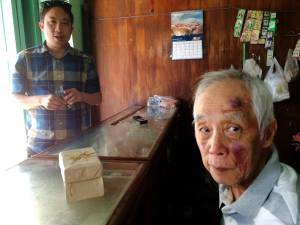
Thiha tells me a funny story about being a kid and playing a coin betting game. We never seen coins in Myanmar – it’s all paper money. They must have changed things pretty radically within Thiha’s lifetime, which is a good sight less than mine.
Anyway, you flip each coin and cover it. Then each person bets – heads or tails. If you guess both, you pay double. If only one, you pay once. Yeah, I know, something about that does not add up. But that’s how he told it. Anyway, a monk boy came by with his bowl, and watched them play this game, the Burmese equivalent of Three Card Monte. He was fascinated. He asked if he could play. Thiha and his boys told him no, he should not. To be fair, they warned him.
Of course he was greedy, and his eyes were spinning with visions of double heads and him taking home the winnings. The reality was quite different. Thiha and his pals gambled the little monk out of all his money pretty easily. But he would not leave it at that. He became angry at them for not staking him some credit so he could win his money back. Reluctantly, they agreed, and they eventually got all his food as well. Serves you right being a gambler, that’s for sure. I think Thiha and his gang must have been doing the Buddha’s work for him that day.
Gavin and Thiha are now confabbing in the other room. Thiha is a pretty serious Buddhist, though not all monk material. But he does try to live well as a Buddhist, and he’s a very gentle person. This may seem a bit odd, because as you may remember, I referred to him as “our gruff driver” many days earlier. Thiha’s outward appearance, which is definitely that of a rougher sort – you may remember his time as a merchant marine, is in serious conflict with the man inside. Nevertheless, as our Buddhist authority, he’s the one we’re asking about traditions and customs in order to get the funeral right.
One of the more interesting images, that of placing a coin in the mouth of the corpse, is obviously somewhat out of date, considering the stories above. So this cannot be depicted in our film since coins have been out for a while. Though stylish and colorful, a wrapped up 50 kyet note shoved in Grandma’s mouth will not have the same impact, nor will it be accurate.
Holy crap, but Myanmar is a land of motorbikes. I don’t think anyone doesn’t ride one. Helmets are somewhat prevalent, but we see lots of people carrying infants with no protection. How does it work? We’ve seen only one accident here. Of course Yangon could be different, because it is the biggest city in Myanmar and the most modern and most populous. Pyin Oo Lwin is, though I use this term with a sense of endearment, kind of backwoods.
I guess no one drives very fast. Plus it seems as though drivers do not pass other vehicles unless that vehicle is really slow, stopped, dangerous, or in some other way a hazard. The kind of lane jockeying and constant cutting off that American drivers do is simply not on display here. Even in Yangon it’s likely to find drivers who are exceedingly opportunistic, but this opportunism does not extend to throwing a vehicle in your oncoming path or causing you to slam on brakes. At least I have not seen too much of it yet. There’s certainly a lot of traffic, though. Bikes generally don’t split lanes, either. Like I say, this may be different in Yangon. When we flew in I thought the traffic was pretty standard for Asian cities – which is to say completely insane. But even then, I don’t remember a lot of jerks cutting other people off, it was just lines of cars crammed seven wide on lanes marked for four, and lots of congestion.
Today’s scenes with Tinmar Aung are going well, as usual. The setups are more complicated and with more actors, but we’re doing OK. Miraculously I’ve found a spot to hide in this incredibly wide shot that includes most of the floor and ceiling. Minshi has been, as usual, extremely helpful suggesting mic placements. He’s of the opinion I should just hide a few lavs and sit this out. But I find a tiny crevasse to stick the boom in and off we go.
And now it’s time for the big funeral. We have been able to get a variety of people to show up for this one. There will be more people in frame for an interior scene than ever before. We’ve relied on daylight from windows quite a bit, and this shot is no exception. Gavin has normally confined his actors and his scenes to one level against a deep background, maybe with some Z-axis blocking. This is one of two or three situations in which he has multiple levels going on at once. Tinmar Aung sits in he middle range while Salai and Victoria have a discussion at the table. In the deep background, and not really in focus, a procession of mourners comes in, one at a time, to pay respects. The blocking alone is the most complicated we’ve had, and yet everything runs smoothly.
Even though we’re doing OK, Gavin thinks he’s behind, so were in trouble. Some kind of parade is always going through town, it seems. At first it was the election, but now it’s in honor of “balloon day,” the weekend of the Tazaungdaing Festival, celebrating the full moon and the end of the rainy season. This holiday has deep Hindu roots, and not only is there feasting, but alms-giving is stressed. Hence the rather brassy parades right in front of sewing shop wherein locals show off what they’re giving the monks this year. It’s more advertisement for the monasteries which, though they constitute the backbone of scholarly Buddhist tradition, are nonetheless parasites.
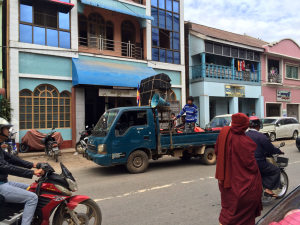
Shooting is somewhat delayed for the sound of blown out loudspeakers blaring squeaky-voiced pop singers. Talk turns to the monks. I remember the “Free Tibet” movement in the US, by which movie stars and celebrities became incensed that China had “reformed” Tibet in the late 50s and absorbed it into the greater Chinese union. What China also did was remove power from the monks, who completely ruled Tibet, and whose alms-taking practices had reduced Tibet to some kind of pro-monk apartheid state. Or so claim many of the Tibetans who did NOT want to be “freed” and were happy that China had come in and brought some prosperity, fairness, and at least sanitation to them.
Now, no one knows whether or not a Tibetan independence movement is necessarily calling for a return to bad old days. Certainly the Chinese government thinks so. The current Dalai Lama is reportedly supporting such a movement, and China would like us to consider his angle here. I’m not suggesting the Dalai Lama is a con artist, but I have sympathy for the Chinese government if they consider all religious people as having stakes in the matter and that they are not necessarily transparent about the situation.
But this also makes one realize that in any country where the monks run about expecting to be fed and clothed by the people, and in such a country where giving to monks is considered spiritual and beneficial morally, that this is a pretty sweet setup for the monks. It’s hard not to see the entire enterprise as parasitical. For the record, my attitude about Christians is nearly the same. I have great respect for those religious folks who walk the walk (and I’ve been privileged to have my anti-religious sentiments challenged by the work of truly good people), but that’s not most of them. I see lots of tent revival preachers who are counting on this performance to pay their kids’s way through college. And when one looks at history back to Ur there’s a long line of similar hucksters. Nice work if you can get it.
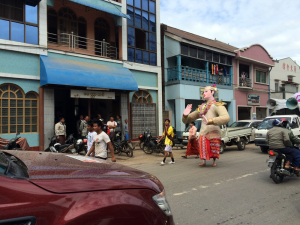
We get the funeral body washing scene in the can and go for coverage. While we wait, Tinmar Aung shows Sister Caroline all the photos she took yesterday. Though I normally wipe my phone every day (more room for new stuff plus no desire to show people my dumb pictures) I left everything Tinmar Aung shot on the device. Her experience with phones is not from weirdos like me who never keep pictures, it’s with everyone else in the world who keeps a million pictures. I figured she’d probably come looking for them and want to show them off.
Would you like to see some of them? Here’s the Tinmar Aung collection:
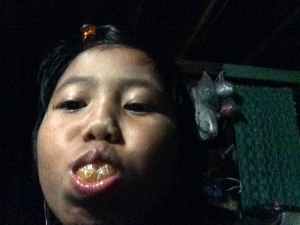
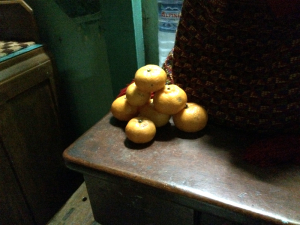
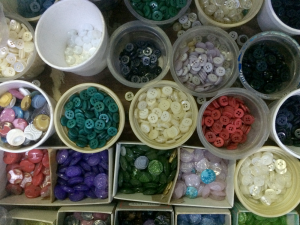
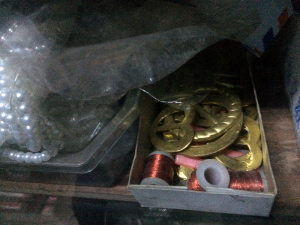
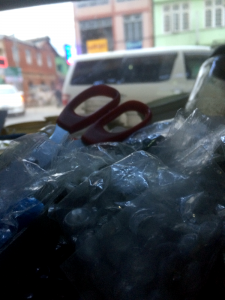

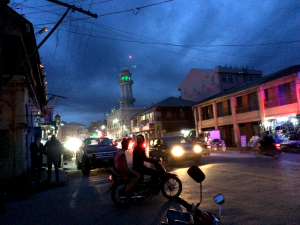
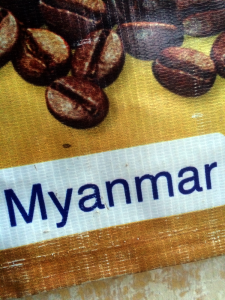

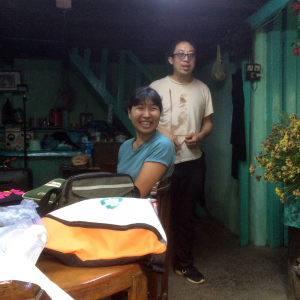
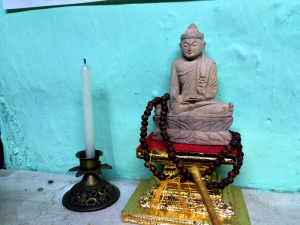
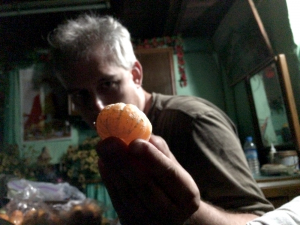
Now Gavin’s toying with the idea of being among the funeral mourners. It is indulgent, but fun, though it will slow us down some.
When I must take my place on the set (I’ve been staying out of the way because it really is complicated) we spiral down into a festival of rehearsals and tweaks. Lots of irrelevant conversations from the non-actors about what they’re doing off screen. Audio levels through the roof and destroying my ears until Gavin calls action, then it’s as silent as a tomb but one that is punctuated by loud motorbikes and sometimes a leftover parade float. But we slog on…
After another fabulous Hone Hone lunch we set up for Tinmar Aung to look through the treasure box. It’s a great shot, but the sudden disappearance of Sister (who just went home, nothing big) makes Tinmar Aung suddenly go soft with tears – abandonment issues we all guess. Perhaps also Tinmar Aung is simply sick of the shoot and would rather go with Sister back to the orphanage. It’s been over two weeks and she has had a few breaks, but nothing like she should have. Were we in the US we would all be jailed for working a kid this hard, but not only is she usually up for it, she excels. And child labor is perfectly acceptable in Myanmar, where we have seen kids as young as seven and eight acting as waiters and servers in restaurants.
The production is down since Tinmar Aung is down. We do not push her. Cecilia, who is easily her favorite person, takes her to the market to buy her a coat (for the balloon festival) and she perks right up. Its a combination of the break and something new to do – no longer the four now somewhat oppressive walls of the sewing shop. Don’t worry, little Tinmar Aung, we all feel the same way. And none of us will get a new coat out of it, either.
We bang out the scene in record time. She’s a pro, even if still a little girl.
Not the same can be said of Grandma. After Tinmar Aung’s scene we set up for Grandma once again and we’ve all been waiting an hour and Gavin is still rehearsing, still not close. Grandma has a big speech to give and John has working with her for quite some time. The crew is betting on how long it will take. Minshi is guessing 15 takes. Gavin does not think Tinmar Aung will last that long and everyone agrees. At least Sean has all the time he needs for tweaks and changes.
I feel like such an old bloated sack today. Everyone in this country is thin and fit. Sure, poverty is the cause of a lot of it, but boy, do I stick out for being a massive fat-ass white guy idiot compared to everyone else. Maybe everyone is smiling at me because they think a fat white guy with a big belly and a lazy eye is funny, not that they’re being friendly. They’re right. A fat white guy with a big belly and a lazy eye IS actually quite funny. I do not begrudge them that.
Minshi sees me writing in this book and requests that I mentioned how he’s losing his patience. Poor Minshi had really been losing his cool lately. But his gripes are somewhat reasonable.
1. We’re overworked. We agreed to be overworked, but none of us realized how this stuff can drag you down when the real tedium sets in. Later on, if something exciting happens, we won’t be thinking about the long days. But when we wait around for nothing to happen it’s a killer.
2. Especially when we know what the outcome is going to be. Gavin is going to compromise, heavily, because what else can he do? This is one of the prices you pay for non professional actors. You simply cannot expect anything out of them, and that’s no one’s fault. If Grandma had touted herself as a master thespian, we could all get mad. But she’s just a nice old lady Gavin cast because he liked the way she looked. So we get what we get.
3. Gavin’s compromise also makes us feel as though we’re not doing the best we can – that we’re doing less than brilliant work. There’s no money in this project, and some of us (like me) do not need the credit. Our only satisfaction is in making a great film, and if we see that’s definitely NOT happening, then we can get demoralized.
4. Though Gavin might know exactly what he’s doing, lack of a coherent script or even a daily schedule is not the best for those who do not know what he is up to. Improvising everything seems cute at first, but two or three weeks into a project it can feel like the whole thing is a teetering disaster. It’s as though our scoutmaster is taking us on a hike in circles but when we ask him where we are he mumbles that he has everything under control. We simply do not believe him.
Filmmakers take note – this is the toughest part of our experiment – getting real performances out of amateurs when there’s no set script. Sadly, not everyone is a writer. So letting everyone find their own right words for the situation can run into trouble. If there were a script or plan we could knock the shots out, too. What we’re doing is, for lack of a better term, grueling.
I am reminded of mumblecore, and I think that is a real problem. Gavin’s not making a mumblecore movie, not in the slightest. But the lack of script and seat-of-the-pants story development reminds me of those films. I don’t think there is a single virtue to working that way, and lots of disadvantages. I have not yet seen a mumblecore movie that did not break the proverbial Artaud/Brecht wall wide open simply by being disorganized enough that it made you think about how the film was made in a ramshackle way rather than allowing you to become involved in the story. And I’m fairly sure most mumblecore mavens are not also Brecht devotees. I think we have found an incompatible aesthetic here.
I do not know why the world is so enthralled with the idea of improvisation. In some fields, like music, it can be sublime. In most other fields it yields disaster far more than brilliance. An ad-lib or impromptu moment from an actor is always welcome. But entirely winging it? It’s a very dangerous path.
Regrettably, only now is Gavin talking about getting serious about slapping all this on a timeline and checking to see if he has a movie. He said this a few days ago, but he still has not done it yet. We all accepted this part of making the movie, but I knew then and now I know well that I could never work this way. It would drive me nuts having so much uncertainty and chaos on a project.
And poor Tinmar Aung is going to get back late to the orphanage again…Good thing we’re giving her the day off tomorrow and then shooting at the orphanage for the next two days.
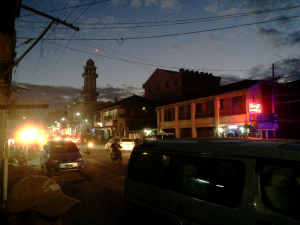
What ends up transpiring is that two hours later we finally start rolling. Gavin has rescued the day by reducing Grandma’s monologue to just a single sentence that she can handle. She was supposed to tell an entire story about her life. She and John had talked and had chosen an actual story from her own life – something that happened to her – that would make a fine addition to the scene. But that was not working because of her Burmese difficulties. Gavin suggested she switch to Kachin. After all, she has an accent, audiences could accept that maybe she switches into a local dialect to talk about her past. No dice. Grandma simply cannot remember her own stories any better than lines we give her. Thus, we change it to a single line.
Half an hour later were done. Tinmar Aung is back at the orphanage before you know it. She’s somewhat irked – it’s occurred to her that whatever clothes we buy for her Sister will end up redistributing among the other children. And she really likes that coat we bought her today, which is a bright red, furry, and very comfortable.
It’s a bit sad, but we can all see why Sister has to do it. She has 58 orphans to look after. Part of keeping some kind of order in a house like that is to rely on pretty aggressive egalitarian principles. And yes, precious snowflakes, some of that is going to have to do with heading off petty jealousies, infighting, and unrest by making sure no one child has appreciably more than any of the others. No, this is no cartoon of socialism that some right-wing idiot wants to fume over. No one is going to be harmed. But imagine how difficult to run the orphanage if one child is singled out, with fancy clothes and attention? For the good of everyone Sister will have to insist on humility.
But that poor girl. We’re aching.
